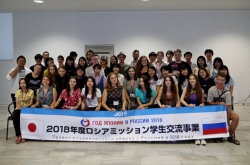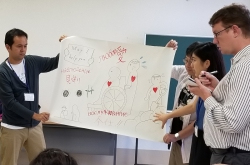Natalya Startseva, 4th year, Department of Intelligent Technologies in Humanities
To become part of the delegation, we had to write motivational letters and be ready to later greet the Japanese students in St. Petersburg. I spent several days composing my thoughts about Japan so as to write a short, but persuasive text about my dreams and goals. Later on, the program’s coordinator contacted me to discuss the most important issues.
I got to know Japan by reading Haruki Murakami’s books, and I grew up on cartoons by Hayao Miyazaki, but I’ve never been to places that inspired them, where they created their works. One could call it a dream come true! I wanted to see real Japan, find Japanese friends and share a piece of our culture with them, which may well slightly shock them, as much as theirs shocked us a bit.
During the program, we visited Kyoto's temples and museums, took part in a traditional tea ceremony, went to Hokkaido to see the disputed Kuril Islands through binoculars and learn the Japanese perspective on the issue. Yet, for me it was meditation that I remembered best: we all sat in the lotus pose and had to be still and silent. If we felt like falling asleep, we could cross our hands which symbolised asking to hit us with a wooden stick. That came as a great help during the morning lectures: after a smack, we felt vivacious and ready.

We also lived in Japanese families for some time. They settled us in traditional rooms with tatami pads, and we had futons instead of beds. I even thought that I may well start sleeping on the floor when I get back to Russia. Also, the Japanese always keep the baths in their houses full of water, and take turns to bathe (after having a shower, naturally). As for the food, they have excellent fresh fish; for such seafood-lovers as me, it is like paradise!
Throughout our travels, we were accompanied by Japanese students: we flew all around Japan, and went to places even they haven’t visited. They were really inspired by the program as well, and are now eagerly waiting for their return visit to Russia. Many of the students from the Moscow State University and St. Petersburg State University spoke Japanese, which made us even closer.
After the trip, I got the urge to go back to studying Japanese. Cultures become similar due to globalization only - both countries watch American movies, use iPhones and the same social networks, many wish to travel and learn more about the world. When talking about traditions and mentality, this is the only way we can study each other’s cultures. Japan and Russia are two different worlds that really connect on programs such as ours.
Henrietta Leiman, first year, Department of Applied and Computer Optics
I stumbled upon a post about this exchange program by accident: someone put it into a common chat. I got interested at once - I’ve had a thing for Japan for some ten years already. I always wanted to compare the image of Japan that I had from books and films with reality. Also, I was interested in talking to native Japanese, learning about their mentality and culture, as well as simply enjoying this country’s rich history and unique traditions.
 Top row: Henrietta Leiman and Daniil Morachev. Bottom row: Nikita Kubarev, Natalya Startseva and Maria Bogdanova from St. Petersburg State University
Top row: Henrietta Leiman and Daniil Morachev. Bottom row: Nikita Kubarev, Natalya Startseva and Maria Bogdanova from St. Petersburg State University
We went to several cities, including Tokyo which was very impressive. A lot of places we went to are off limits to regular tourists, even most Japanese find it hard to get there. For instance, we went to a tea ceremony in Kyoto. The building that hosted it was over 400 years old, and had none of the technological amenities we’re used to. The tea masters venerate their traditions; also, they believe that it’s important to feel the time of the year the ceremony takes place in, so there’s no heating. The process of preparing matcha (a special kind of Japanese tea) may seem tiring - one has to constantly stir it, so your hands get tired fast. Also, you have to spend the whole ceremony on your knees, so your legs get numb, though the tea masters have no problems with it.
We went to many impressive places, but I liked the temples in Kyoto best. In a way, Kyoto reminded me of St. Petersburg: it is also its country's most cultural city, and was once its capital. There, we also cooked traditional Japanese sweets. Mine turned out quite bad, though the natives told me they were beautiful - I don’t know if they really thought so or they just said it out of politeness. We also went to Osaka, Japan’s second largest city, though we didn’t have much time there. We went to Hokkaido as well - Japan’s most Eastern spot, where we could enjoy the views of nature free from skyscrapers.
Living in Japanese families was strange at first, though we soon got used to it and could communicate well even though they didn’t know much English. Family members were always glad to see us and cared a lot about us. There was lots of food, and everything was so good that we didn’t know how to stop. Local cuisine is very different from Russian, and you always find something new to try. Also, we slept on futons; they say it's really good for your back, and I liked them even more than regular beds.

Japanese students are very nice. You can spend good time with them, talk, learn about Japanese life and culture, and share information of your own - well, I guess this is what you’d call a cultural exchange.
Almost everything in Japan seemed strange and unique. The architecture there is stunning, especially in Kyoto, you won’t see anything like that in Russia. Even the skyscrapers in major cities have their unique traits - the brightness and palette is just astonishing.
After the trip, my intention to learn Japanese only increased. When talking in English, you miss out on an important part of a country’s culture, a lot of words are comprised of other words with different meanings. Also, I want to go to Japan once more and just take my time walking the streets and learning even more about it. I hope I’ll have such a chance in the future!
Nikita Kubarev, 2nd year, Department of Secure Information Technologies
I got into this program after I agreed to host Japanese students who came here last year. I always liked communicating with foreigners, so I readily applied for it, and my application was approved. For my help, I was offered the opportunity to go to Japan this year.
My reason for going was my intention to learn more about the Japanese culture; also, I couldn’t reject the chance to go to a country most get problems in getting a tourist visa to. I just couldn’t miss the chance to see its beauty.
Out trip’s program was really diverse - we visited different places, from the most modern to traditional ones. The organizers wanted to show us as much as they could in this short time. I find it hard to share my impressions, as I am still experiencing a sort of culture shock. I really liked the country and Japanese mentality. I generally like to travel, but this place will hold a special place in my memories.
The only problem was the traditional Japanese food they treated us to. They use lots of seafood in their home cooking, which feels strange to my taste. Actually, Japanese eat common food a lot, but with slightly different ingredients, but their traditional cuisine is very original for a Russian person and can come as a sort of a gastronomic disappointment.
 Daniil Morachev, Nikita Kubarev and Maria Bogdanova from St. Petersburg State University
Daniil Morachev, Nikita Kubarev and Maria Bogdanova from St. Petersburg State University
Japan is a country with very old traditions. I was pleasantly impressed with their hospitality. When we were living with a Japanese family, they treated us not as guests, but as honorable family members. The Japanese are very welcoming and always ready to help. They are very interested in communicating, and as soon as you dive a little deeper in their culture (for instance, start answering to their greetings in Japanese, they really like it when foreigners speak in their language), they stop seeing you as a foreigner and guest and treat you as a friend.
Language barrier is surely an issue. Japanese learn English at school, but they won’t answer to you in the street, even if they understand you. I noticed that they are generally a shy nation, but once you make contact, you see that they are friendly and pleasant to communicate with. I made friends with a student named Okaharu. He is really kind, cheerful, open-minded and honest. Japan’s younger generation is quite liberal, and we didn’t have any conflicts even in what had to do with political disputes.
At first sight, our cultures seem different. Slavs and Asians - what can they have in common? Yet, after coming here, I found it hard to check what I saw against what I thought about this country and its culture. I believe that though we have different lifestyles, history, and attitude, we have a common approach.
After this trip I firmly decided that I want to return there some time in the future. I got the urge to spend more time on learning new languages, travelling, and acquainting myself with different cultures; moreso since my profession gives me the opportunity to work remotely. Also, I decided to participate more actively in different exchange programs.





